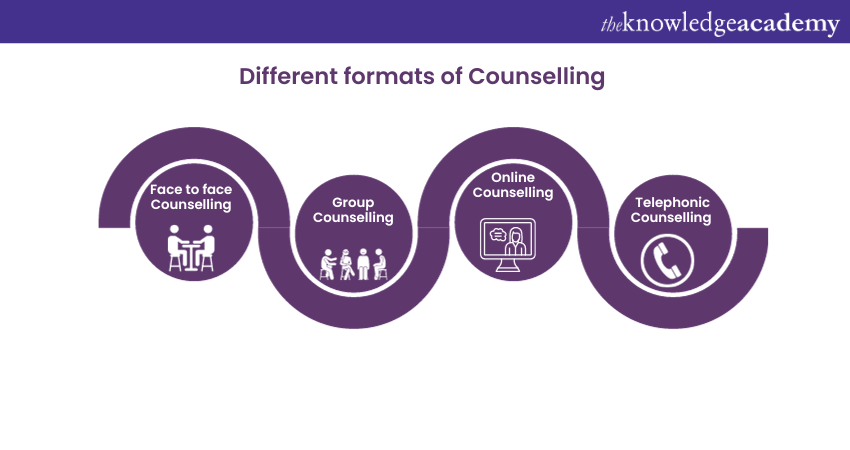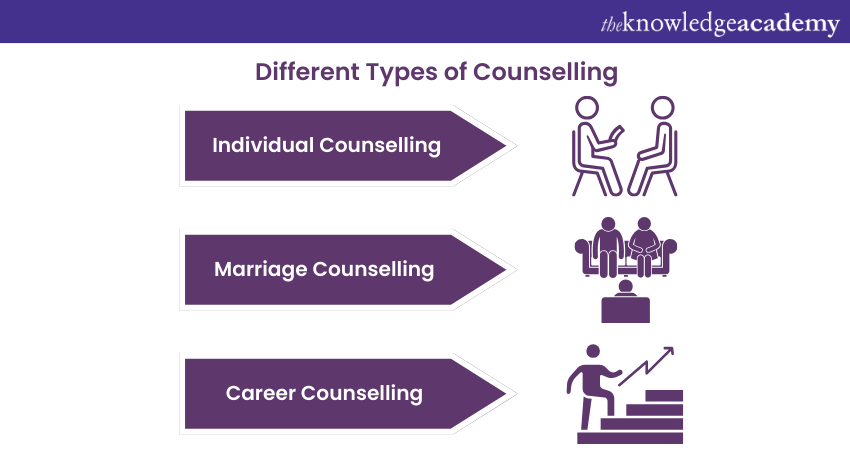We may not have the course you’re looking for. If you enquire or give us a call on +36 18508731 and speak to our training experts, we may still be able to help with your training requirements.
Training Outcomes Within Your Budget!
We ensure quality, budget-alignment, and timely delivery by our expert instructors.

Over these past few years, Mental Health has become one of the top priorities, both personally and professionally. People are actively seeking help from professionals to explore their thoughts, emotions, and experiences. But did you know what all Types of Counselling these professionals use?
If you're considering seeking Counselling for yourself, it's essential to understand its different types available today. This blog explores diverse Types of Counselling, empowering you to make well-informed decisions on your healing and self-discovery journey with confidence.
Table of Contents
1) What is Counselling?
2) What are the Different Formats of Counselling?
3) Different Types of Counselling?
a) Individual Counselling
b) Marriage Counselling
c) Career Counselling
d) Psychodynamic Therapy
e) Cognitive Behavioural Therapy
f) Person Centred Counselling
g) Play Therapy
h) Couples Counselling
i) Reality Therapy
j) Mindfulness-based Therapy
4) Conclusion
What is Counselling?
Counselling is a form of therapy that helps individuals overcome their problems and regain lost confidence by guiding them to face and conquer their issues. The primary goal of Counselling is to aid people in addressing and resolving their personal, emotional, psychological and interpersonal issues and enhance their overall well-being.
What are the Different Formats of Counselling?
Before learning about what are different Types of Counselling, you should know that there are different formats of Counselling used today. These formats are nothing but a medium through which therapy is provided. So, let’s have a look at them in detail:

Face to Face Counselling
Face to Face Counselling is one of the most common forms. Here the patients meet with the Counsellor in their office and discuss how they can solve their problems. Here, the Counsellor directly converses with the patients, providing them a comfortable and judgement-free environment. They ask them about their family background and medical history, then dive into their problems.
Learn how to deal with patients face to face with our Mental Capacity Training - join today!
Group Counselling
This format of Counselling generally takes place when the patients require the help of a support group. The patients may undergo group Counselling to recover from the loss of a loved one or to combat addiction problems.
The Counselling group is generally comprised of six to eight people who meet face-to-face with a trained group therapist. Here, they talk about the problems they are facing and how these problems are affecting them.
Online Counselling
If you had read the news, you would have noticed that during the pandemic, there were several Counsellors who were providing their services online. Online Counselling is conducted via the internet. Here, the patient who cannot travel far for their treatment can get easy access to their treatment through online platforms.
Moreover, people who are suffering from Social Anxiety also prefer this format of Counselling. This is because they want to protect their identity and safeguard themselves from any kind of judgement.
Enhance your child psychology expertise by registering for our Child Psychology Course today!
What are the different Types of Counselling?
Now you are aware of the different formats of Counselling. Let us discuss now what are the Types of Counselling that can help you in addressing your personal and emotional issues and enhancing overall life satisfaction:

Individual Counselling
This method of Counselling entails personal Counselling with a trained Psychiatrist. Here, an appointment is made by the patient to seek one on one advice about how they should proceed towards their goals or overcome their fears, anxiety or trauma. This kind of Counselling is generally done for the personal development and well-being of the individual.
If you want to know more about Mindfulness and Healing, join our comprehensive Mindfulness Training!
Marriage Counselling
This Type of Counselling helps both partners understand each other holistically, positively impacting their Mental Health. Here, couples come to a trained Counsellor to understand the root cause of their troubles and how they can eradicate them. The Counsellor focuses on understanding each person’s point of view and suggests solutions that can improve their bonding, leading them towards a positive relationship.
Career Counselling
Many students struggle with what career to choose after school. Even working professionals find it challenging to make a change in their careers. They may want to explore other career opportunities.
Through this professional guidance, individuals gain insights into their strengths, interests, and aptitudes. This helps align them with suitable career paths. Career Counsellors employ various tools, assessments, and interviews to evaluate a person's skills and preferences. As a result, individuals explore potential career options that match their aspirations and goals.
Psychodynamic Therapy
This talking therapy model is non-directive and aims to help individuals comprehend why certain things are repeatedly challenging and distressing for them. By understanding their problematic situations, they can then manage them more effectively.
The Psychodynamic Therapy is based on the belief is that past experiences have an impact on present difficulties, and people tend to repeat behaviour patterns unconsciously. Understanding these patterns can help individuals gain control over their current situation. This Type of Counselling suits those who are interested in gaining more self-knowledge and symptom relief.
Cognitive Behavioural Therapy
Cognitive Behavioural Therapy (CBT) is a widely used method of treating symptoms of anxiety and depression. This Counselling Types focuses on changing thoughts and behaviour, which can lead to relief of symptoms causing Mental Health disorders.
The emphasis is on what people want to achieve rather than on historical issues, as the model assumes that their behaviour is learned and can therefore be unlearned. CBT is well-suited to those who do not wish to delve into the reasons behind their thoughts and behaviour. However, it can be challenging for some people to change their habitual patterns of thinking and behaviour.
Person-centred Counselling
Person-centred Counselling is a unique approach where the therapy sessions are in control of the client. The therapist believes that each client holds the key to their own healing and growth and should be treated as the expert of their own experience. This approach recognises that every individual has the necessary internal resources required for growth and personal transformation. The therapist aims to provide a safe and nurturing environment by showing unconditional positive regard, empathy, and congruence.
Play Therapy
Play Therapy is a highly effective form of therapy that assists children and adolescents in managing past traumas, adjusting their behaviour, gaining clarity about their self-image, and building positive relationships.
The therapy involves a dynamic relationship between the client and Therapist, allowing clients to express themselves, explore their experiences, and make sense of any difficult or painful situations they may have gone through. Play Therapy is a powerful tool that can help individuals address their emotional and psychological needs, leading to personal growth and healing.
Couples Counselling
Couple's Therapy, also known as Relationship Therapy or Relationship Counselling, is a form of Psychotherapy that aims to address issues within a romantic relationship, marriage, and family. It is an effective approach for individuals who have persistent relational difficulties that cannot be resolved through Individual Counselling.
The primary goal of Couples Therapy is to develop and improve the relationship by using techniques drawn from traditional and contemporary marriage Counselling approaches. It aims to enhance communication, emotional connection, and intimacy between partners. Couple Counselling is similar to Family Counselling, with a focus on the couple. It provides specialised relationship therapy to help couples overcome obstacles in their present and future and improve their relationship.
Reality Therapy
Just like other forms of Therapy, Reality Therapy is centred around the idea that individuals have the ability to regain control over their lives, even if they have Mental Health issues. The primary objective of this therapy is to assist patients in gaining more control over their lives and developing fulfilling and effective relationships. Instead of concentrating on symptoms, reality therapy emphasises personal responsibility for one's actions.
Mindfulness-based Therapy
Mindfulness is a Type of Therapy that encourages patients to adopt a mental state characterised by non-judgmental awareness of their current experiences, including their bodily sensations, thoughts, consciousness, and environment. The Therapist aims to promote openness, curiosity, and acceptance in the patient. Their goal is to help the patient avoid impulsive reactions to emotional triggers and instead respond thoughtfully, which allows them to take control of their emotions and regulate their response to the situation.
Enhance your mental health expertise with our Counselling Training – sign up today!
Conclusion
We hope that this blog has given you an insight into the different Types of Counselling and the formats. Understanding these methods can assist you in addressing personal and emotional issues and improving your mental well-being. As a result, you can improve the quality of your life, as well as others.
Empower your mental health journey by registering for our expert-led Mental Health Course today!
Frequently Asked Questions

The most common Type of Counselling is Cognitive Behavioural Therapy. It focuses on changing negative thought patterns to improve behaviour and emotional regulation

The three pillars of Counselling are relationship building, problem assessment, and goal setting. These stages help establish trust, understand issues, and create a plan for positive change.

The Knowledge Academy takes global learning to new heights, offering over 30,000 online courses across 490+ locations in 220 countries. This expansive reach ensures accessibility and convenience for learners worldwide.
Alongside our diverse Online Course Catalogue, encompassing 19 major categories, we go the extra mile by providing a plethora of free educational Online Resources like News updates, Blogs, videos, webinars, and interview questions. Tailoring learning experiences further, professionals can maximise value with customisable Course Bundles of TKA.

The Knowledge Academy’s Knowledge Pass, a prepaid voucher, adds another layer of flexibility, allowing course bookings over a 12-month period. Join us on a journey where education knows no bounds.

The Knowledge Academy offers various Mental Health, including Mental Health and Wellbeing Training, Anxiety Courses, Social Psychology Training and Child Psychology Course. These courses cater to different skill levels, providing comprehensive insights on Emotional Wellbeing.
Our Health & Safety Blogs cover a range of topics related to Mental Health, offering valuable resources, best practices, and industry insights. Whether you are a beginner or looking to advance your Mental Health skills, The Knowledge Academy's diverse courses and informative blogs have got you covered.
Upcoming Health & Safety Resources Batches & Dates
Date
 Counselling Masterclass
Counselling Masterclass
Fri 7th Feb 2025
Fri 4th Apr 2025
Fri 6th Jun 2025
Fri 8th Aug 2025
Fri 3rd Oct 2025
Fri 5th Dec 2025







 Top Rated Course
Top Rated Course



 If you wish to make any changes to your course, please
If you wish to make any changes to your course, please


